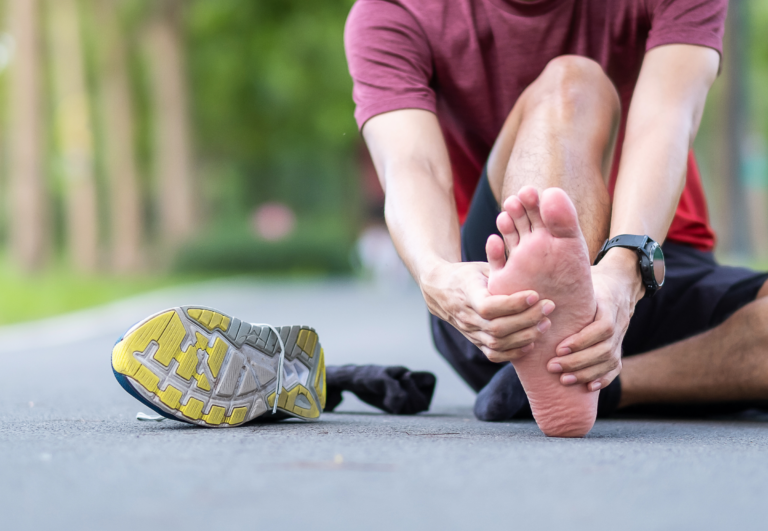Is Running Late At Night Bad? (3 Risks, 5 Benefits, and 7 Safety Tips)
Everybody has preferences. Some runners crave a morning workout, others prefer to revitalize their afternoon, and night owls love to pound the pavement after sundown. This might leave you wondering if one is any better than the other.
Is running late at night bad?
Running late at night is not bad and could even provide several benefits, such as improved sleep, aiding weight loss, and controlling your diet. Special safety precautions should be taken when running at night, such as wearing reflective clothing, bringing your phone, and running in a well-lit, populated area.
Read on to learn why running at night is healthy, the benefits and risks of running at night, and expert tips to ensure a safe nighttime run!
Is it bad to run at night before bed?
A misconception is floating around that running late at night is bad.
It is not bad to run at night before bed. Running late at night has undeniable health benefits like improved sleep and performance, reduced stress, higher probability of weight loss, and lower risk of injury. While risks are incurred from low lighting, abiding by safety tips helps minimize risk and maximize the potential benefits.
Late-night exercise is commonly blamed as a source of poor sleep; this is the opposite of the truth. Running at night improves sleep quality; runners fell asleep faster and spent more time in REM, according to this Harvard study.
Runners also benefit from better performance due to lower temperatures and an abundance of fuel from eating throughout the day. Chances are runners will eat less at night, too, leading to weight loss. Can’t eat while you’re running!
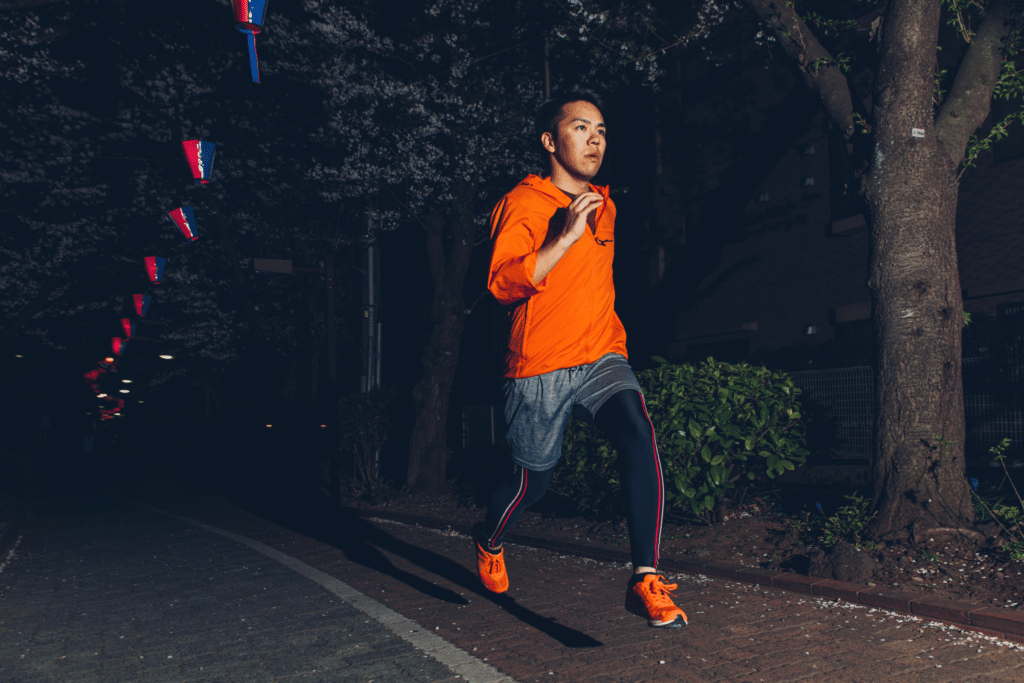
Night running is also a good stress reducer. It’s been linked to lower levels of primary stress hormones, and it’s a great outlet to let out some anger following an irritating day at work!
Running at night is not without its risks, though. Low visibility leaves runners susceptible to crime and increases the danger of being hit by an oncoming vehicle or tripping over terrain.
By taking proper precautions like running with a friend and compensating for the lack of natural lighting, running at night is totally worth it!
Is it weird to run at night?
Many runners run in the morning or at night because they must accommodate their work schedule. Is it weird to run at night?
No, it is not weird to run at night. Many runners prefer running late at night over in the morning or during the day.
Runner’s World published a study in 2014 that compiled survey results of when people around the globe prefer to run. The surveys span across 30 countries and 177 million runners.
The surveys showed clearly that runners around the world actually prefer to run at night! Running late at night is not taboo at all; it’s actually the chosen time for a large percentage of runners.
A whopping 32 percent of runs occur at night on weekdays. Runners would rather enjoy their slow-paced morning and then blow off steam after work by going for a run.
Is it healthy to run at night?
Considering night is an acceptable time of day to go running, should we pursue night runs? Are they any healthier than morning or daytime runs?
Yes, it is healthy to run at night. There are benefits of running at night, ranging from higher quality sleep, increased pace, and a higher chance at sustained weight loss.
It’s healthy to run at any time during the day! Anything beats being a couch potato.
That said, night runs have additional benefits that morning or daytime runs simply cannot provide. Studies performed by the University of Chicago and the University of South Carolina confirm these benefits.
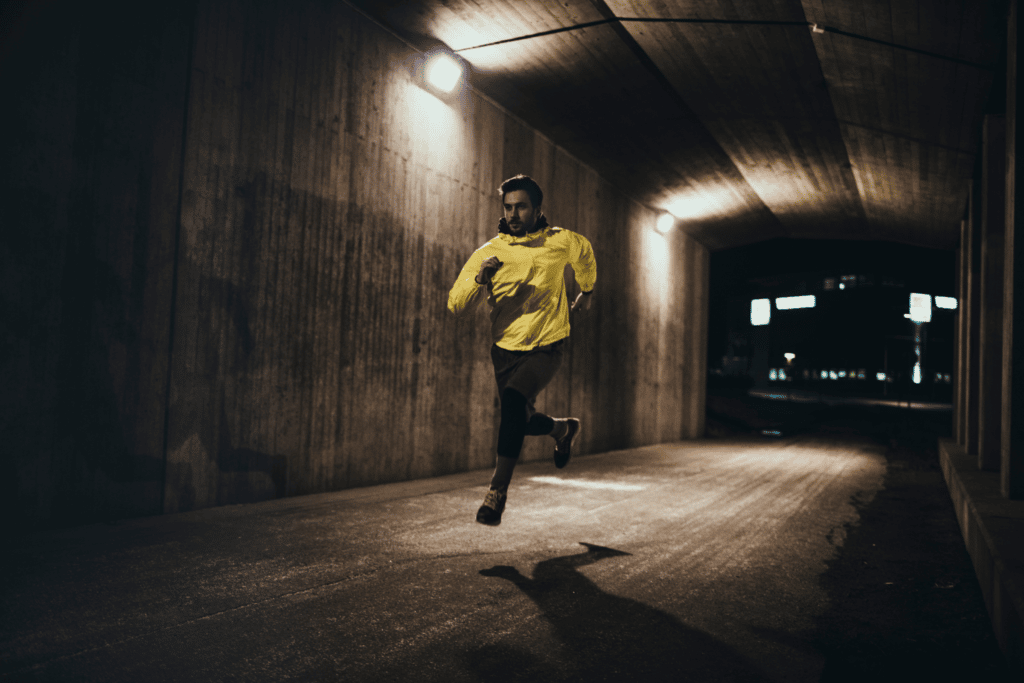
Running at night helps you sleep better, whereas running during the day does not drastically affect your quality of sleep.
Running at night also improved metabolism and decreased stress. Runners who ran at night showed less cortisol and thyrotropin in their blood samples; these are hormones associated with stress.
Lastly, runners who run at night were found to have lower blood glucose levels than those who don’t. Convinced yet?
Potential benefits of running at night
Running is always beneficial; runners receive monumental health benefits from improved cardiovascular fitness to lower average BMI!
However, running late at night has additional benefits. Some of the additional benefits of running at night include:
- Improved sleep
- Reduced stress
- Improved performance
- Sustainable weight loss
- Muscles and joints already primed
Improved Sleep
Sleep is an often overlooked aspect of health. The amount and quality of sleep you get is directly proportional to quality of life and life expectancy.
Can running at night boost sleep?
Running at night improves sleep due to physical exertion and increased energy expenditure. Essentially, runners tire themselves out and receive high-quality sleep in return.
Studies have shown that 97% of people who performed high-intensity exercise at night slept better than when they exercised during the day.
The reasoning for this is clear. Running, a high-intensity activity requires a large amount of energy expenditure. When we run, we burn lots of calories and end up tired as a result.
Tiring yourself out before bed makes it easier to drift off and stay asleep. The next time you need a good night’s sleep, go for a run before bed!
Reduced Stress
Everyone seems plagued by perpetual stress, whether that be from work, school, financial issues, etc. It’s an epidemic. Running at night could be the answer.
Running at night reduces stress by allowing runners to blow off steam when they run. Running at night is also correlated with lower cortisol levels and thyrotropin, the main hormones resulting directly from stress.
After a long day of work, we can all relate to the irritation we feel at the hands of our coworkers or bosses.
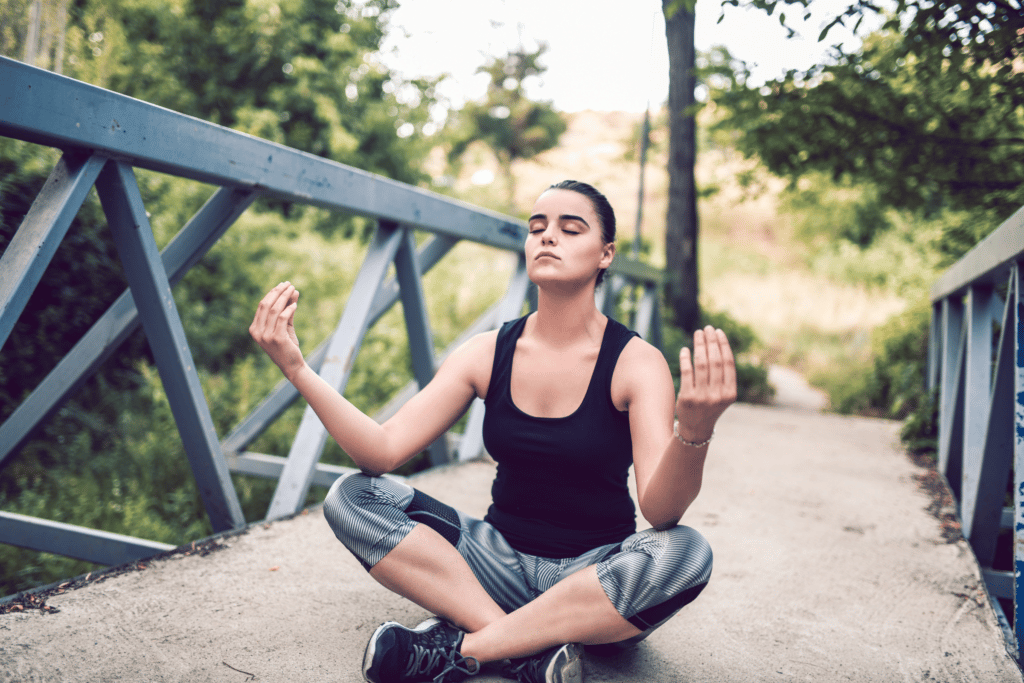
Running at night after work or school is an excellent way to clear your mind and reduce your stress levels. It’s actually scientifically proven that it reduces cortisol and thyrotropin as well.
Over time through running, your body trains itself to produce less cortisol in stressful situations. This helps runners deal with physical and mental stress alike.
Improved Performance
Runners are all about performance, whether that be improving times or running for longer distances. Luckily, running at night can be a useful tool.
Running at night leads to improved performance because runners can avoid hot temperatures and eat properly to accumulate energy.
Running at night has two benefits that allow for faster performance.
First, at night, temperatures are lower than during the heat of the day. Running at night ensures your body is able to regulate its temperature and maintain a healthy state.
Running at night also allows for proper fueling. Running in the morning is often fasted; unless you have time to eat an hour or two before you run, it’s not worth eating anything at all.
Eating prior to running throughout the day builds energy stores that can be utilized at night. When eating during the day, it’s important to eat whole foods that are easily digestible to reap the full benefits.
Sustainable Weight Loss
Running is one of the highest calorie-burning activities, so it’s great for slimming up! Running at night is even better, believe it or not.
Running at night is good for sustainable weight loss because it encourages healthy eating during the day and discourages binge eating junk food at night.
Nobody wants to eat a burger and fries before a run. If you know you have to run later in the day, you’ll likely make healthier choices at mealtime.
Instead of eating junk food, you’ll consciously decide to grab easily digestible food that makes you feel good!
Night runners are also less likely to binge eat at night. Late-night meals and snacks are a huge contributor to weight gain, so eliminating the tendency to eat calorie-dense foods late at night makes you much less likely to put on the pounds.
Muscles and Joints Primed for Running
Have you ever gotten up for a run in the morning and felt achy? Running at night can solve this issue.
Running at night allows the body to warm up and stretch out over the course of the day before a run. Muscles and joints are warmed and primed for running by moving around during the day.
Running in the morning comes at a cost: pain. Many runners are stiff when they wake up in the morning.
Couple this with rushed morning warm-ups, and the opportunity for injury is glaring. Running later in the day solves both these problems.
Movement during the day at work or at school helps to naturally loosen the body. Night workouts also allow a longer warm-up period because there isn’t a rush to begin running.
Potential risks involved in running at night
Running at night has its benefits, but many risk factors should be considered when deciding to run at night.
Although the benefits are wonderful, the risks may be off-putting for many runners, in which case running at another time may be preferable. Here are some of the potential risks night runners will face:
- Visibility issues
- Getting hit by a vehicle
- Being assaulted
Visibility Issues
All the risks of running at night stem from the lack of light; visibility is no exception.
Running at night exposes runners to visibility issues that lead to a higher chance of injury.
When running at night, the sun has set, and all runners have to rely on are street lamps. This is seldom sufficient lighting.

Due to the lack of lighting, it’s much harder to see the surface you’re running on. If you’re running on the sidewalk, a crack or hole in the pavement will not be obvious and you might eat it.
Be careful of the surface when you run at night. Tripping and falling can result in serious injury.
Getting Hit by a Vehicle
Reckless drivers are bad enough during the day, not to mention even worse at night. Without sufficient lighting, drivers are less aware of their immediate surroundings.
Running at night makes it more likely for runners to be hit by a vehicle due to the lack of visibility for drivers.
On average, 122,000 runners are hit by cars annually. Care to guess what time of day is most frequent?
If you guessed at night, you’d be correct. Drivers at night have a hard time seeing runners. There’s also a greater chance drivers are either intoxicated or sleepy. This is a recipe for disaster.
Being Assaulted
While the risk for women is much higher than for men, being assaulted is a very real risk for all runners regardless of the time of day. Nighttime running only accentuates that.
Running at night makes it more likely that runners will be assaulted. Violent crime peaks at 9 pm when many runners are out exercising.
60% of women report that they have been harassed while running. Hardly any women run at night anymore because the environment is conducive to harassment. It shouldn’t be this way, but it is.
Lack of lighting leads to criminal activity, whether it’s violent in nature or simply verbal abuse. Either way, the chances of assault increase at night. Take the proper precautions to avoid falling victim to such an action.
Take a look at this video comparing a man and woman’s experience running at night alone:
How to keep yourself safe when running at night
Hopefully, you’ve done your due diligence and assessed the potential benefits and risks of running at night. If running at night is still of interest, here are seven tips to ensure a safe running experience:
- Run with a headlamp
- Wear a reflective vest
- Run in well-lit areas
- Run against traffic
- Run without earbuds
- Find a buddy
- Keep your phone on you
Run with a Headlamp
When running in the dark, it can be hard to see your surroundings. The pavement may be cracked, and there could be a tree root sprawling across the sidewalk.
Run with a headlight to illuminate your surroundings and reduce your risk of tripping.
Headlights are a worthwhile investment. Better yet, there are plenty of cheap options to begin with!
By running with a headlight, runners can see what’s going on beneath their feet and adjust their stride accordingly. Over are the days of tripping and scraping up your knees because of a minuscule crack in the pavement.
Wear a Reflective Vest
In the dark, runners are barely visible to cyclists and vehicles alike. Fix this by wearing reflective clothing.
Runners should wear a reflective vest, or another reflective article of clothing, to increase their visibility to other individuals.
Wearing a reflective vest will increase your visibility to other people tenfold. Headlights will flash on the reflective vest, making it impossible for a driver to simply overlook you.
While a reflective vest works best because it covers your entire torso, any article of clothing is better than none. You could wear shorts with reflective stripes, reflective gloves, etc.
Run in Well-lit Areas
Many neighborhood streets are not well-lit. They are not suitable for running, nor any other activity at night.
Opt to run in well-lit areas when running at night. This increases visibility and decreases your risk of falling victim to assault or injury.
Similar to how a headlamp provides light to see your surroundings, running in a well-lit area with vibrant street lamps greatly improves your safety.
Find a main road or trail, maybe a track, that is well-lit late at night. Public locations with great lighting are preferable.
Run Against Traffic
Vehicles are one of the biggest risks when running at night. If a driver can’t see you, the likelihood of them hitting you skyrockets.
Run against the flow of traffic to gain awareness of the vehicles in your surroundings.
By running against the traffic flow, you’ll see the cars coming towards you. If you run with your back against the oncoming cars, you have zero awareness of what is happening around you.

While it may not be a huge advantage, seeing oncoming traffic at least offers an opportunity to get out of the way if a vehicle is inching too close for comfort.
Run Without Earbuds
My favorite way to run is to listen to a music playlist or an informational podcast. While this may keep me entertained and focused during my run, it may not be the safest option.
Run without earbuds so you can hear your surroundings. Increased awareness of your surroundings, visually and auditorily, is always a sure way to increase safety and minimize risk.
Many runners alike love to listen to content when they run. While this is great, it’s not a safe practice. You can’t hear oncoming cars or a criminal sneaking up behind you when you have your earbuds in.
Remove your earbuds to be able to hear what’s happening around you. If you really want to listen to music or a podcast, play it from your phone’s speaker.
Find a Buddy
It’s unfortunate that many criminals begin to lurk out of the shadows at night. Running alone may not be safe, especially in cities or communities with above-average crime rates.
Run with a buddy to prevent being singled out by potential abusers. Running with a buddy is also great because they can help you up if you trip or injure yourself in the dark.
Running with a buddy is great! Find a friend and ask if they would be willing to run with you. No, it’s not the most thrilling social activity, but it’s the safest way to run at night.
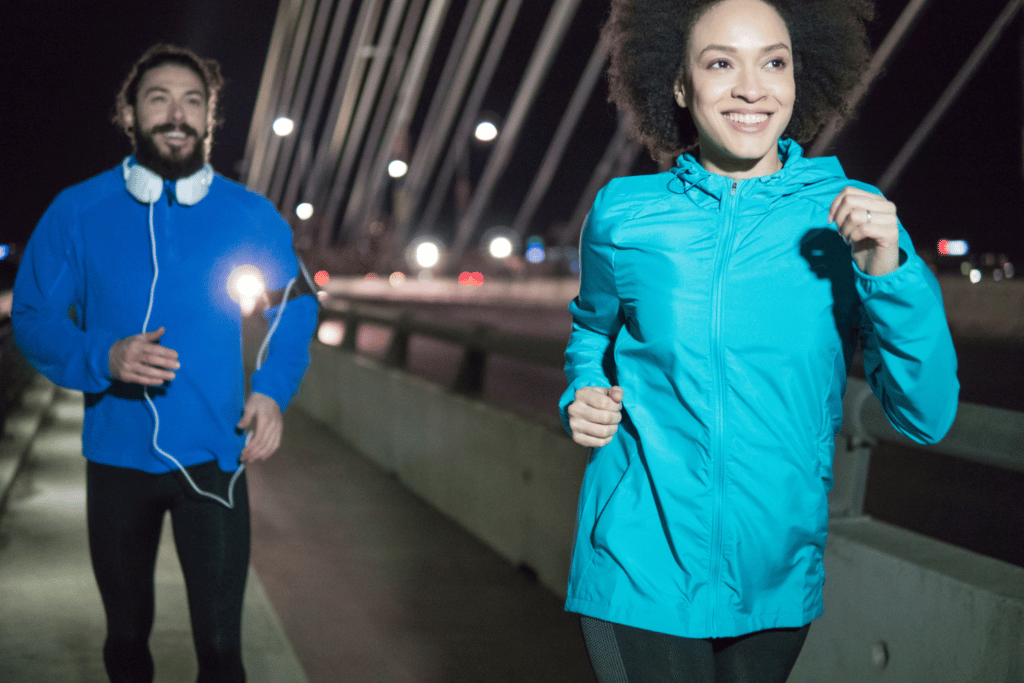
Groups of 2 or more runners are much less likely to be assaulted in any way, and if you become injured, your friend is available to offer immediate help.
Keep Your Phone on You
Do I even have to say this? I’ve never met anyone that doesn’t have their phone on them!
When running at night, keep your phone on you. For convenience, you can purchase shorts with zipper pockets or an armband to avoid having to carry your phone in your hand.
If you can’t run with a friend, running with your phone is the next best option.
If you find yourself in a crunch, help is only a phone call away. Additionally, the location is trackable through the phone if something seriously bad happens to you.
I like to run with an armband to hold my phone, but it’s truly personal preference.



